Nissan Altima Hybrid Review
Hybrid cars are the automaker’s equivalent of straight teeth: everyone wants them. Carmakers without hybrids are beginning to look, well, a little unkempt. Not wanting to be perceived as a snaggletooth, Nissan joins the club with its new-for-‘07 Altima Hybrid. The company describes its first foray into gas-electric frugality as "the first hybrid that drives like a Nissan." The firm’s marketers clearly intend for Nissan’s self-fashioned sporting image to set the Altima hybrid apart from its key competitors. They’re also convinced, presumably, that consumers will know what this tagline means.
That may be too much of an intellectual leap. After all, Nissan's current lineup runs the dynamic gamut, from the nimble Versa to the titanic Titan. Even if we restrict the field to sporting machinery, should prospective hybrid buyers expect the uncouth thrills of the torque-steering SE-R Spec V? The grippy, hefty confidence of the 350Z? The loping, nose-heavy gait of the Maxima? Or, as John Cleese might say, “something completely different?”
Further muddying the waters: much of the Altima Hybrid's running gear is licensed from Toyota. The borrowed tech includes the electric motor and battery pack, electric-assist steering system, CVT transmission and battery-charging regenerative brakes. The resulting fuel savings are spectacular; Nissan says Altima Hybrid drivers can expect 41/36mpg. But with all of these shared components, the Altima Hybrid claims to dynamic uniqueness seem a bit, um, dubious. Is it "the first Nissan that drives like a Toyota?"
First, let’s at least agree that the new Altima doesn’t look like a Toyota. While all midsize sedans suffer a certain inherent stuffiness, the Altima’s shape is more interesting than most, with leaner, crisper lines than the Camry dares wear. Moreover, the ’07 Altima appears— applause, please —more compact than the outgoing model, though its actual dimensions have changed little.
Slide into the Altima Hybrid, and you’ll find that its driver’s station incorporates a similar pinch of pizzazz, supplied mostly by the triple-barrel vents atop the center stack. But the quality of materials used is a bigger surprise; the dash is draped in rubbery, hide-like polymers, while the hard plastics elsewhere are low-gloss and tight-fitting. Sure, the switchgear and bin lids feel a bit more brittle than a Toyota’s, but unlike the last Altima’s cabin, this one can’t be described as “toylike.”
Unfortunately, it can’t be called “spacious” either. While the Altima’s front cabin fits naturally and offers contemporary helpings of head and legroom, the rear bench’s low cushion and fair knee clearance are merely acceptable for this class. Families with lanky, cranky teenagers will appreciate the airier quarters of the hybrid Camry and Accord.
If the aforementioned families do pick the Altima Hybrid over its Honda and Toyota rivals, their teens won’t harbor any great relish for borrowing Dad’s wheels on Saturday night. Fact is, if you’ve driven a Prius, you’ve already experienced the burning excitement that awaits behind the wheel of the Altima Hybrid.
Surprised? Don’t be. After all, most of the elements that suck the fun right out of Toyota’s hybrids are present here, too, from the “slipping-clutch” feel of the CVT’s operation to the limp, twitchy guidance afforded by the hectic-assist steering. Nissan says the Hybrid’s suspension is slightly stiffer than other four-cylinder Altimas’, but there’s little incentive to exercise it, partly because slowing back down involves awkward negotiations with the touchy, feel-free regenerative brakes.
The Hybrid’s accelerative performance doesn’t drip adrenaline either, but that’s expected in a car designed for thrift. As in its other applications, Toyota’s parallel hybrid drivetrain allows you to whoosh around slowly on electric power alone— or keep up with traffic, the gas engine phasing in and out with mild shudders. Brisk moves are accompanied by a strident, hollow drone from Nissan’s 2.5-liter, 162 horsepower four, but at least they’re on the menu.
How much will the Altima Hybrid’s sterile, slightly sloppy dynamics matter to prospective buyers? In all likelihood, very little. With the partial exception of the 253-horse Accord, there isn’t a hybrid on the market that’s particularly stimulating to drive. Given the mechanical disconnect integral to such systems, that’s not likely to change anytime soon.
Instead, the Altima Hybrid offers a package essentially similar to the Camry Hybrid’s, with a little less space, a lot more style and fuel economy that makes Honda’s cooking, sales challenged Accord Hybrid seem like a bad global citizen. (Though both vehicles surpass Super Ultra Low Emissions Vehicle (SULEV) standards and meet Partial Zero Emissions Vehicle (PZEV) requirements.) Nissan expects the Altima Hybrid’s base pricing to slot neatly between the $26,200 Camry and the $31,090 Accord.
In sum, I offer an amended version of Nissan’s pitch for this electrified— but not electrifying— Altima: “The first hybrid that looks like a Nissan.” Considering the target market’s priorities, that’s probably enough to put Nissan in the hunt.
More by P.J. McCombs
Latest Car Reviews
Read moreLatest Product Reviews
Read moreRecent Comments
- Calrson Fan Jeff - Agree with what you said. I think currently an EV pick-up could work in a commercial/fleet application. As someone on this site stated, w/current tech. battery vehicles just do not scale well. EBFlex - No one wanted to hate the Cyber Truck more than me but I can't ignore all the new technology and innovative thinking that went into it. There is a lot I like about it. GM, Ford & Ram should incorporate some it's design cues into their ICE trucks.
- Michael S6 Very confusing if the move is permanent or temporary.
- Jrhurren Worked in Detroit 18 years, live 20 minutes away. Ren Cen is a gem, but a very terrible design inside. I’m surprised GM stuck it out as long as they did there.
- Carson D I thought that this was going to be a comparison of BFGoodrich's different truck tires.
- Tassos Jong-iL North Korea is saving pokemon cards and amibos to buy GM in 10 years, we hope.



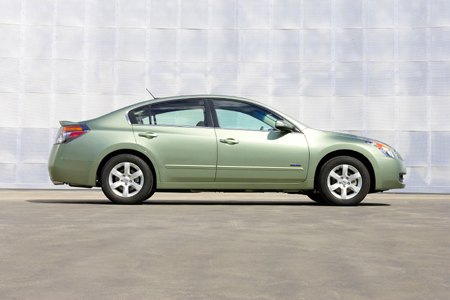


















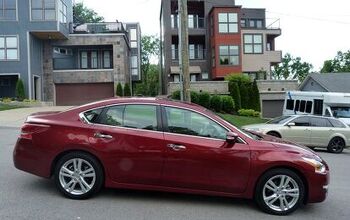
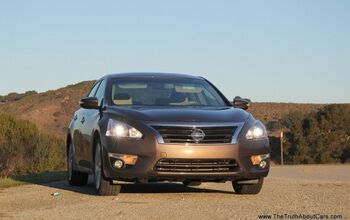
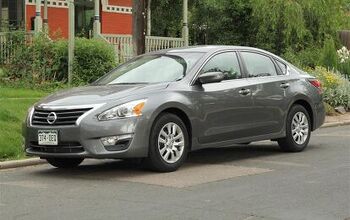
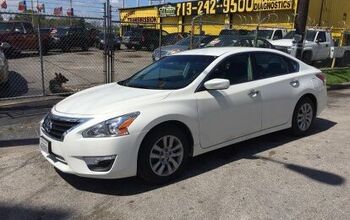
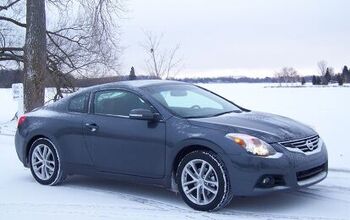










Comments
Join the conversation
I bought a Nissan Altima Hybrid in August and I love it. I had to jump through some hoops to get it here in Arizona, but I finally got it. I got the full package (with Nav, leather, etc.) since I hope to not have to buy a car for at least 5 years. I bought it to take advantage of the tax refunds, since if you lease you can't get rebates. I really love the car so far. I trade in an SUV which used to get me 14 MPG with my driving style. The Altima has gives me 31 MPG so far, but I have also adjusted my driving style a bit, since I can only use EV under 40 mph. By the end of my time in the SUV, I tried hard to increase MPG but only got up to 16 MPG. So, right off the bat, I'm saving about half with each fill up. Granted, I bought it in the middle of summer, where the temps go above 110 F, so I've had to use the A/C a lot! My last fill-up was 10/8, 16.32 gallons, 481.5 miles, avg. MPG 31. I'm hoping it will improve once the weather improves. The trunk space is still pretty big, though the batteries take up a good chunk of the back of the trunk. (Its been hard adjusting from the space in the SUV to the car. Where do I put my ladders now?) I've noticed a few places where you can tell Nissan took shortcuts in the interior and such, but the keyless entry/start is cool and the tech package has bluetooth phone, iPod connection, navigation, XM radio and even traffic warnings. So far, I'm happy with it. In fact I love it.
I bought a Pontiac G5 last year. It advertised as 27mpg city, 40mpg hwy. It's real life gas milage based on my real experience? 24 mpg city, 34 mpg hwy. My son's Honda Civic died last month, I gave the G5 to him and I just bought a 2010 Prius. Reason? 1. Same price...er...cost as the G5 in the long run. Real life gas milage of the Prius (brand new, not even broken in) are 50mpg city, 52 mpg hwy (and I am not a hyper-miler). Saves around $1000 worth of gas a year as compared to the G5 (my own real experience, not from manufacturer's projected data) = $10,000 in 10 years, which is exactly the amount I paid for the Prius more than the G5. ( I drive every car >10 years until they go to car heaven, no re-selling) 2. More room in every aspect. Mid-sized vs compact, huge leg room for all, huge trunk for cargo (can carry a bike inside when back seats folded down, G5? forget about it.) 3. More comfort, looks and feels better quality. 4. 134 horses vs the G5's 150hp, but way more startup torque because of the electric motor. If you use its power mode, it runs like a sporty car at the cost of slightly worst fuel economy, like 40mpg city, which is still better than many cars. Once a Mustang rev his engine on idle at a red light beside my Prius. I took the hint and challenge and stepped on it in power mode when the light turned green. He couldn't out-run me, period. (He actually gave me a thumbs-up before he turned away). Can't do that with the G5. 5. Potentially the Prius can be converted to a plugged-in, making it virtually unlimited mpg city for normal daily driving, and yet has no limit in range because of the ICE. (Just waiting for the battery technology to mature and cost to come down, maybe in a couple of years.) Just a statement for the rich people? I don't think so! Forget about hybrids of normal car models which makes them marginally better fuel economy but much less practical. I'm semi-retired working part time, not rich, just smart.